| Srl | Item |
| 1 |
ID:
094154
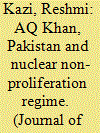

|
|
|
| 2 |
ID:
089250
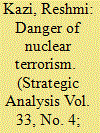

|
|
|
|
|
| Publication |
2009.
|
| Summary/Abstract |
The concept of nuclear terrorism is possibly the least understood of all dangers emanating from nuclear weapons. However, certain drivers like the nuclear black market (the AQ Khan Network), proliferation of nuclear technology, and the increasing demand for nuclear energy can make it easier for terrorist organizations like Al Qaida to acquire fissile material. The threat of nuclear terrorism cannot be ignored any longer. Nuclear terrorism is a plausible phenomenon that deserves adequate consideration, substantial countermeasures, expertise, and competence to combat it.
|
|
|
|
|
|
|
|
|
|
|
|
|
|
|
|
| 3 |
ID:
105627


|
|
|
| 4 |
ID:
152002
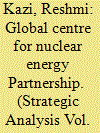

|
|
|
|
|
| Summary/Abstract |
In the 21st century, nuclear security (NS) risks are more tangible with the probability of nuclear weapons and materials falling into the hands of terrorists becoming more real. The NS threat scenario presents a complex matrix of violent terrorism, Islamist militancy, a proliferation network originating from Pakistan (A. Q. Khan Network) and its spread to Iran, Libya and North Korea. To mitigate nuclear risks and inspire global nuclear confidence, an institutionalized structure is critical for strengthening NS. India has developed its centre of excellence (CoE) called the Global Centre for Nuclear Energy partnership (GCNEP).
|
|
|
|
|
|
|
|
|
|
|
|
|
|
|
|
| 5 |
ID:
146551


|
|
|
| 6 |
ID:
089900
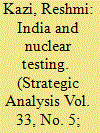

|
|
|
|
|
| Publication |
2009.
|
| Summary/Abstract |
The main strategic rationale for keeping the option of nuclear tests open will be for the creation and maintenance of the Indian nuclear deterrence capabilities. An effective credible nuclear deterrent would be comprised of four components: (a) sound nuclear doctrine; (b) deterrent capabilities; (c) delivery capabilities; and (d) adversaries' defensive capabilities. A deeper understanding is imperative at this stage to arrive at any conclusion on the issue of India's testing option.
|
|
|
|
|
|
|
|
|
|
|
|
|
|
|
|
| 7 |
ID:
132931
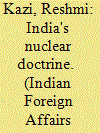

|
|
|
|
|
| Publication |
2014.
|
| Summary/Abstract |
The aim of India's nuclear deterrence capability has been to safeguard itself against blackmail and coercive diplomacy of adversaries. Its doctrinal principles of minimum nuclear deterrence and NFU are consistent with India's declaration of a modest nuclear weapons policy. The official announcements, in the aftermath of the May 1998 tests indicated that India has set out on a pragmatic course of action. Sixteen years after the tests, the Indian government's policies reflect this approach substantially.
|
|
|
|
|
|
|
|
|
|
|
|
|
|
|
|
| 8 |
ID:
143821
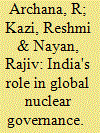

|
|
|
|
|
| Publication |
New Delhi, IDSA, 2016.
|
| Description |
56p.pbk
|
| Contents |
Focus: nuclear security and India
|
|
|
|
|
|
|
|
|
|
|
|
Copies: C:2/I:0,R:0,Q:0
Circulation
| Accession# | Call# | Current Location | Status | Policy | Location |
| 058467 | 355.82511954/ARC 058467 | Main | On Shelf | General | |
| 058468 | 355.82511954/ARC 058468 | Main | On Shelf | General | |
|
|
|
|
| 9 |
ID:
095961


|
|
|
|
|
| Publication |
2010.
|
| Summary/Abstract |
The emerging changes in the security calculus within the Korean Peninsula are forcing Japan to revisit its existing position on the nuclear issue. The changing security environment has triggered several debates within Japan on the nuclearisation of the island nation. Although, at present, domestic opinion within Japan is opposed to exercising the nuclear option, there has been a break in the hitherto established taboo to have an open debate on the country's nuclear policy. These debates have triggered thinking on the circumstances in which Japan might choose to cross the nuclear rubicon.
|
|
|
|
|
|
|
|
|
|
|
|
|
|
|
|
| 10 |
ID:
139293


|
|
|
|
|
| Summary/Abstract |
The importance of nuclear security in Asia needs to be focused upon in view of the emerging challenges of nuclear proliferation, growing nuclear arsenals, expanding civilian nuclear energy programmes, weak export controls, zones of domestic instability and terrorism in several regions within the continent. This article focuses on the factors that pose potential risks to nuclear security in Asia. It emphasises the prevailing factors endangering the security of nuclear and radiological materials in Asia. The article stresses the need to strengthen nuclear security in Asia and reinforce effective nuclear security worldwide.
|
|
|
|
|
|
|
|
|
|
|
|
|
|
|
|
| 11 |
ID:
126792


|
|
|
|
|
| Publication |
New Delhi, Institute for Defence Studies and Analyses, 2013.
|
| Description |
148p.Pbk
|
| Series |
IDSA Monograph Series No.27
|
| Standard Number |
9789382169277
|
|
|
|
|
|
|
|
|
|
|
|
Copies: C:2/I:0,R:0,Q:0
Circulation
| Accession# | Call# | Current Location | Status | Policy | Location |
| 057535 | 363.32/KAZ 057535 | Main | On Shelf | General | |
| 057536 | 363.32/KAZ 057536 | Main | On Shelf | General | |
|
|
|
|
| 12 |
ID:
091397


|
|
|
|
|
| Publication |
2009.
|
| Summary/Abstract |
In order to construct an operational nuclear device, terrorists need to obtain the requisite fissile materials - Highly Enriched Uranium (HEU) or plutonium. It has been proved that, generally, it is much simpler to devise a crude nuclear bomb with HEU than with plutonium. Hence, terrorists can have 'reasonable confidence' in the performance of weapons-grade HEU bombs. The magnitude of the threat of nuclear terrorism from Pakistan's HEU-based nuclear weapons programme is assuming alarming proportions. However, adequate preventive steps can be taken to minimize the danger.
|
|
|
|
|
|
|
|
|
|
|
|
|
|
|
|
| 13 |
ID:
152434


|
|
|
|
|
| Publication |
New Delhi, IDSA, 2017.
|
| Description |
134p.pbk
|
| Series |
IDSA Monograph Series no.; 59
|
| Standard Number |
9789382169727
|
|
|
|
|
|
|
|
|
|
|
|
Copies: C:1/I:0,R:0,Q:0
Circulation
| Accession# | Call# | Current Location | Status | Policy | Location |
| 059012 | 355.825119/KAZ 059012 | Main | On Shelf | General | |
|
|
|
|
| 14 |
ID:
157067


|
|
|
|
|
| Publication |
New Delhi, IDSA, 2017.
|
| Description |
134p.pbk
|
| Series |
IDSA Monograph Series no.; 59
|
| Standard Number |
9789382169727
|
|
|
|
|
|
|
|
|
|
|
|
Copies: C:1/I:0,R:0,Q:0
Circulation
| Accession# | Call# | Current Location | Status | Policy | Location |
| 059011 | 355.825119/KAZ 059011 | Main | On Shelf | General | |
|
|
|
|
| 15 |
ID:
147213


|
|
|
|
|
| Summary/Abstract |
A watershed moment for nuclear security was reached when global leaders from more than 50 countries including India and other organisations met successively over six years (2010–2016) to develop an effective and sustainable plan for global nuclear security. At the end of six years, much has been accomplished to improve and upgrade nuclear security in several countries. Despite this perseverance, threats to nuclear security still remain undiminished, primarily because wrong people nursing a malicious agenda desire nuclear and radiological materials.
|
|
|
|
|
|
|
|
|
|
|
|
|
|
|
|
| 16 |
ID:
094565


|
|
|
|
|
| Publication |
2010.
|
| Summary/Abstract |
President Barack Obama's insightful speech on April 5, 2009, in Prague portends significant changes in the US policy approach towards arms control and nuclear disarmament.1 Obama's enlightened statement has kindled hopes that mankind is nearing a turning point since its tryst with the nuclear bomb. Much of this will depend enormously on our past experiences with the bomb since it was first dropped on Hiroshima and Nagasaki in 1945. Michael Krepon's excellent book Better Safe than Sorry: The Ironies of Living with the Bomb says that instead of overblowing the threat of a nuclear armageddon, it is important that the policy-makers secure nuclear materials from falling into the wrong hands.
|
|
|
|
|
|
|
|
|
|
|
|
|
|
|
|